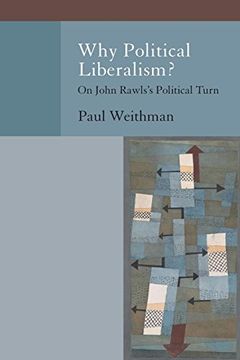Share
Why Political Liberalism? On John Rawls's Political Turn
Paul Weithman (Author)
·
Oxford Univ Pr
· Paperback
Why Political Liberalism? On John Rawls's Political Turn - Paul Weithman
Choose the list to add your product or create one New List
✓ Product added successfully to the Wishlist.
Go to My Wishlists
Origin: U.S.A.
(Import costs included in the price)
It will be shipped from our warehouse between
Wednesday, July 24 and
Wednesday, July 31.
You will receive it anywhere in United Kingdom between 1 and 3 business days after shipment.
Synopsis "Why Political Liberalism? On John Rawls's Political Turn"
In Why Political Liberalism? , Paul Weithman offers a fresh, rigorous, and compelling interpretation of John Rawls's reasons for taking his so-called "political turn". Weithman takes Rawls at his word that justice as fairness was recast as a form of political liberalism because of an inconsistency Rawls found in his early treatment of social stability. He argues that the inconsistency is best seen by identifying the threats to stability with which the early Rawls was concerned. One of those threats, often overlooked by Rawls's readers, is the threat that the justice of a well-ordered society would be undermined by a generalized prisoner's dilemma. Showing how the Rawls of "A Theory of Justice" tried to avert that threat shows that the much-neglected third part of that book is of considerably greater philosophical interest, and has considerably more unity of focus, than is generally appreciated. Weithman painstakingly reconstructs Rawls's attempts to show that a just society would be stable, and just as carefully shows why Rawls came to think those arguments were inconsistent with other parts of his theory. Weithman then shows that the changes Rawls introduced into his view between "Theory of Justice" and "Political Liberalism" result from his attempt to remove the inconsistency and show that the hazard of the generalized prisoner's dilemma can be averted after all. Recovering Rawls's two treatments of stability helps to answer contested questions about the role of the original position and the foundations of justice as fairness. The result is a powerful and unified reading of Rawls's work that explains his political turn and shows his enduring engagement with some of the deepest concerns of human life.
- 0% (0)
- 0% (0)
- 0% (0)
- 0% (0)
- 0% (0)
All books in our catalog are Original.
The book is written in English.
The binding of this edition is Paperback.
✓ Producto agregado correctamente al carro, Ir a Pagar.

